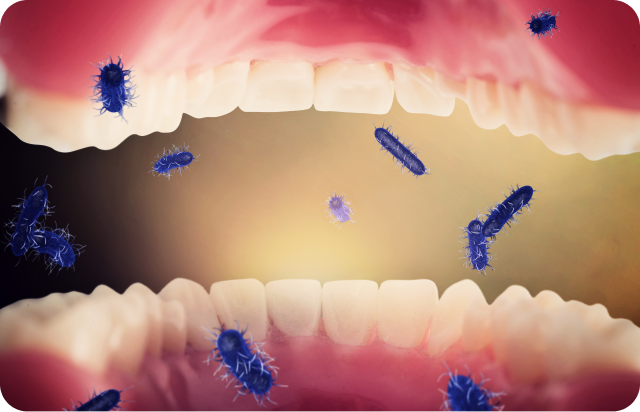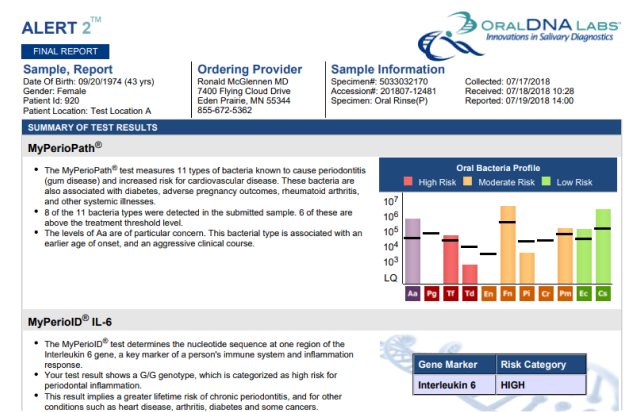
Alzheimer's disease is a debilitating and incurable condition that affects millions of people worldwide. While the exact causes of Alzheimer's are still not fully understood, there is growing evidence that suggests a link between oral health and the development of this disease.

Alzheimer's disease is a progressive brain disorder that affects memory, thinking, and behavior. It is one of the most common causes of dementia, affecting millions of people worldwide. The causes of Alzheimer's are not well understood, but recent research has shown that the oral microbiome may play a role in its development.


Recent research has shown a connection between the oral microbiome and Alzheimer's disease The oral microbiome is the collection of microorganisms that inhabit the oral cavity, including bacteria, viruses, fungi, and other microbes. Studies have found that the presence of certain bacteria in the oral microbiome may increase the risk of developing Alzheimer's disease.

Studies have shown that the oral microbiome may play a role in the development of Alzheimer's disease. The bacteria that cause gum disease such as Porphyromonas gingivalis, have been found in the brains of Alzheimer's patients. Researchers have found that P. gingivalis can enter the brain through the bloodstream or nerve pathways and cause damage to brain cells, leading to inflammation and the development of Alzheimer's disease.
Furthermore, research has shown that changes in the oral microbiome can occur years before the onset of Alzheimer's symptoms, making it a potential early warning sign for the disease.



Porphyromonas gingivalis is a Gram-negative anaerobic bacterium that is commonly associated with periodontal disease, which is a severe form of gum disease, which is characterized by inflammation, destruction of gum tissue, and eventual loss of teeth if left untreated.
P. gingivalis is a rod-shaped bacterium that forms biofilms, which are complex communities of bacteria that adhere to surfaces, including teeth and gum tissue. This bacterium has the ability to evade the immune system and can produce a variety of virulence factors that contribute to its pathogenicity. Some of the virulence factors produced by P. gingivalis include enzymes that degrade gum tissue, toxins that damage host cells, and molecules that modulate the host immune response.
Research has shown that P. gingivalis is not only associated with oral health problems but also has been implicated in systemic health issues. Studies have suggested that P. gingivalis may be involved in the development of various systemic conditions, including cardiovascular disease due to its ability to enter the bloodstream from the oral cavity and spread to other parts of the body.
In particular, P. gingivalis has been linked to an increased risk of cardiovascular disease by promoting inflammation, contributing to the formation of atherosclerotic plaques (fatty deposits) in arteries, and interfering with blood clotting mechanisms. Additionally, P. gingivalis has been found in atherosclerotic plaques in arteries, indicating a potential role in the development and progression of cardiovascular disease.


Maintaining good oral hygiene is crucial for preventing gum disease and maintaining a healthy oral microbiome This includes brushing teeth twice a day, flossing regularly, and visiting the dentist regularly for cleanings and check-ups. If gum disease is present, it is important to seek treatment from a dentist as soon as possible to prevent further complications and maintain oral health.
The connection between Alzheimer's disease and the oral microbiome is an emerging field of research, with much still to be discovered.

Generally, a salivary testing report will include the patient's identifying factors such as age, name, gender, and the date of the test. Next it will identify the testing results which could include inflammatory markers, oxidative stress markers, and genetic markers. Finally it will include a section on interpreting your results.
At Dentulu, we highly recommend each patient to schedule an appointment with their general dentist or primary care physician, or one of our highly trained Dentulu Teledentists who can discuss with you and assess your current dental and health conditions as well as prior health history to come up with the most appropriate care plan for your needs.
See Sample Report

It’s simple! Click the link below, choose the package you'd like, follow the prompts, and have the kit delivered right to your door!
Once your test results come in, you can interpret the results yourself, follow up with your regular dentist, or schedule a consultation with one of our Dentulu Teledentists from your computer or mobile device at any time that is convenient for you!
 Interpreting Your Test Results
Interpreting Your Test Results